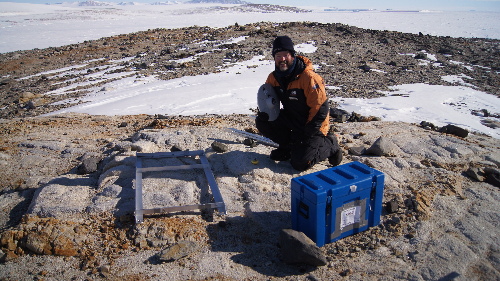You can contact LEARNZ, part of CORE Education, at:
Postal Address:
PO Box 13 678,
Christchurch 8141,
New Zealand
Senior Lecturer at the National School of Surveying, University of Otago.
I lecture University of Otago surveying students in the topic of land development engineering, and I undertake research in the area of Antarctic geophysics. My main area of research is studying the interaction between the ocean, ice shelves and sea ice.
After completing my PhD in 2001 in the USA, I came to New Zealand to work as a post-doctoral researcher in the Physics Department at the University of Otago. This work involved wintering over in Antarctica in 2003 as part of a sea ice / ocean interaction research project. After completing my post-doc, I worked as a civil engineer at a Dunedin-based engineering consultancy from 2005 – 2008. In 2008 I took up a position at the School of Surveying where I have been fortunate enough to undertake Antarctic fieldwork for the past five field seasons.
Being in a position to regularly undertake research in Antarctica. It is a real privilege to work in such an awe-inspiring location.
Marking student assignments. It can be challenging to assess sixty or so assignments at a time while trying to make sure you are using a consistent approach for each assignment!
I am a member of the K131 team – our objective this season is to study the interaction between the McMurdo Ice Shelf, the underlying ocean and the sea ice. We’ll do our work from a camp on the sea ice that will be positioned immediately in front of the edge of the ice shelf.
I was part of a team of three people who studied the thickening of the sea ice cover over the winter of 2003. We were the first group to undertake a winter study of sea ice in this part of Antarctica since the mid 1980s. We managed to run a number of successful experiments over the winter, and the data we collected has been used by our group and others to advance our understanding of how Antarctic sea ice forms.
On my first trip to Antarctica, I was entrusted with carrying some sensitive scientific equipment with me on the flight down. It was supposed to stay with me at all times because it needed to be kept warm, and the air temperature when we arrived on the ice was around -30 °C! I carried it off the plane, and then I was so completely over-awed by my first view of Antarctica that I happily put the box in the back of the ute (in the -30 °C cold) as we set off to Scott Base. The trip took about 30 minutes, and we were halfway there before I realised what I had done. Fortunately the equipment was not damaged. What I learned was that you can’t let the beauty of Antarctica distract you from doing your job.
Skiing, cycling, tramping and kayaking.

Greg Leonard working down in Antarctica. Image: University of Otago.